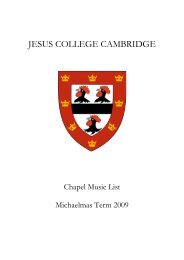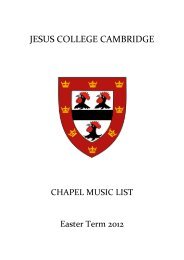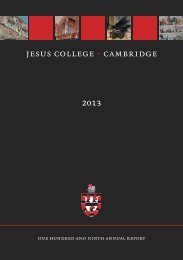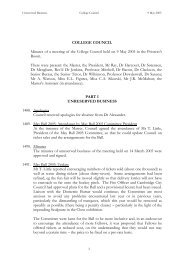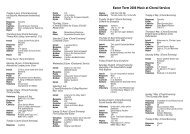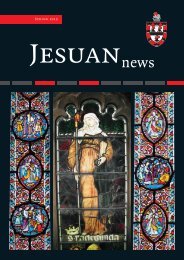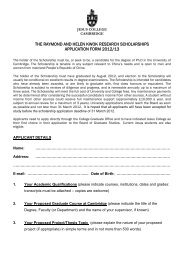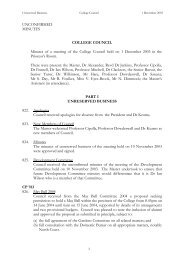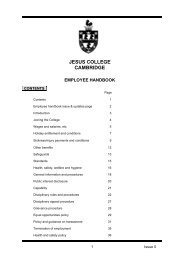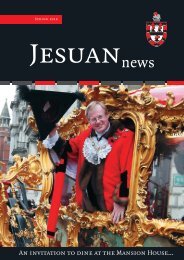2012 Annual Report - Jesus College - University of Cambridge
2012 Annual Report - Jesus College - University of Cambridge
2012 Annual Report - Jesus College - University of Cambridge
Create successful ePaper yourself
Turn your PDF publications into a flip-book with our unique Google optimized e-Paper software.
CREATOR OF THE MODERN COLLEGE I <strong>Jesus</strong> <strong>College</strong> <strong>Annual</strong> <strong>Report</strong> <strong>2012</strong> 51<br />
unmarried, but in practice they were almost<br />
always filled from among its own recent<br />
graduates, one <strong>of</strong> them (like the Mastership)<br />
by the bishop <strong>of</strong> Ely in his absolute<br />
discretion. There being no time limit on<br />
tenure, vacancies arose irregularly. Only three<br />
or four Fellows were needed to run the place<br />
and do the basic teaching in Mathematics and<br />
Classics, along with a little Divinity, <strong>of</strong> those<br />
<strong>of</strong> its 70 students who were not seeking an<br />
Honours degree. This was all that was<br />
<strong>of</strong>fered. So almost all the other Fellows were<br />
non-resident – their rooms were sub-let –<br />
appearing in the <strong>College</strong> only occasionally,<br />
though usually for the Audit each December<br />
when they learnt how much their fellowships<br />
had brought them. At <strong>Jesus</strong> only six <strong>of</strong> the<br />
Fellows were required to be in Holy Orders,<br />
It was, however, unthinkable that the Tutor,<br />
the <strong>College</strong>’s main teaching <strong>of</strong>ficer, should<br />
not be a clergyman – for he stood in loco<br />
parentis, responsible not only for the students’<br />
studies, but for their finances, their personal<br />
behaviour, and their religious guidance. But<br />
unless a Fellow was in Orders, and so in the<br />
longer run eligible for any <strong>of</strong> the fifteen<br />
livings in the <strong>College</strong>’s gift that happened to<br />
fall vacant, there was not much to be gained<br />
from a fellowship beyond some intellectual<br />
kudos, and the maintenance (so long as the<br />
holder remained unmarried) <strong>of</strong> a pleasant<br />
connection with his student days.<br />
Having performed creditably, if without<br />
great distinction, in the Mathematical Tripos<br />
and fallen hopelessly in love with the river (he<br />
was Captain <strong>of</strong> Boats in 1851), Morgan did<br />
not at once seek ordination, but remained<br />
living in <strong>College</strong> as its Sadleirian Lecturer in<br />
Mathematics (an early eighteenth century<br />
benefactress had founded one in each<br />
college: stipend £20 p.a.), and then as a<br />
<strong>College</strong> Lecturer, helping with the teaching<br />
<strong>of</strong> the Ordinary degree students. After five<br />
years he was elected (1858) to a Ley Bye-<br />
Fellowship (an early nineteenth century<br />
endowment). He was to be the last Sadleir’s<br />
Lecturer and the last <strong>of</strong> the Bye-Fellows: all<br />
the lectureships were abolished and the<br />
endowment used for a pr<strong>of</strong>essorship, while<br />
the bye-fellowships were converted into<br />
entrance scholarships. In 1858 Morgan set<br />
out his (and the <strong>College</strong>’s) stall with the<br />
publication (by the then local firm <strong>of</strong><br />
Macmillan) <strong>of</strong> A Collection <strong>of</strong> Problems and<br />
Examples in Mathematics Selected from the <strong>Jesus</strong><br />
<strong>College</strong> Examination Papers. His fellowship<br />
came, eventually and hesitantly, in 1860. 6 His<br />
own teacher (to whom the book was<br />
dedicated) having left <strong>Jesus</strong> for King’s,<br />
Morgan had become the mainstay <strong>of</strong> the<br />
<strong>College</strong>’s Mathematics teaching. Having<br />
been ordained in 1859 on his bye-fellowship,<br />
without serveing a curacy, he was in 1862<br />
elected Dean, and in the following year<br />
appointed Tutor. His predecessor had<br />
married and become the incumbent <strong>of</strong> a local<br />
parish – the last Tutor <strong>of</strong> <strong>Jesus</strong> for whom the<br />
<strong>of</strong>fice was but a temporary staging-post in a<br />
clerical career. Morgan was to make it his<br />
life-time’s work.<br />
In 1863 the <strong>College</strong> was at a low ebb. Over<br />
the last twelve years student numbers<br />
had shrank from 70 to 40: in 1859 there<br />
had been only five freshmen. Whereas in<br />
1851 there had been nine colleges with<br />
fewer students than <strong>Jesus</strong>, now there were<br />
only five, and since 1860 no Jesuan had<br />
been successful in any Honours<br />
examination.<br />
It is difficult to be sure <strong>of</strong> the reasons for<br />
this decline. The <strong>College</strong>, although<br />
previously seen as a place <strong>of</strong> some interest,<br />
appears now to have been widely regarded as<br />
one <strong>of</strong> <strong>Cambridge</strong>’s backwaters. Two <strong>of</strong> the<br />
moving spirits behind the Chapel’s<br />
restoration – John Gibson, and the<br />
pioneering geophysicist, Osmund Fisher –<br />
had long left their fellowships for <strong>College</strong><br />
livings, and their enthusiastic and generous<br />
supporter, Sir John Sutton, the musicologist,<br />
had surrendered his fellow commonership<br />
and charge <strong>of</strong> the choir school he had<br />
founded and run, on becoming a Roman<br />
Catholic. The restoration programme had<br />
ground to a halt: the outer Chapel still lay as<br />
dreary and desolate as it had been since the<br />
Civil War. To everything those men had stood<br />
for, French’s successor as Master, G.E.<br />
Corrie, was strongly antipathetic. And to<br />
much else too. Both as Master and as Vice-<br />
Chancellor he had refused to have anything<br />
to do with the Royal Commission inquiring<br />
into the <strong>University</strong> and its colleges, declining



